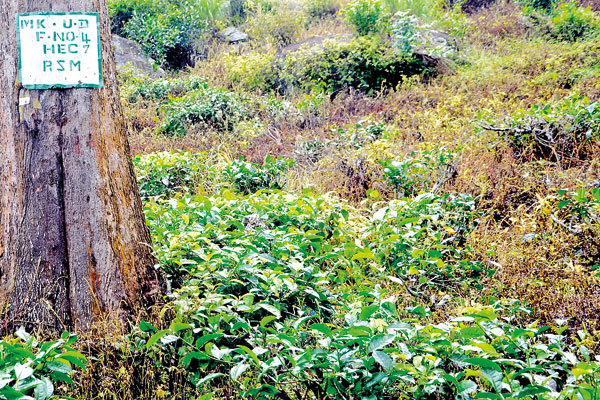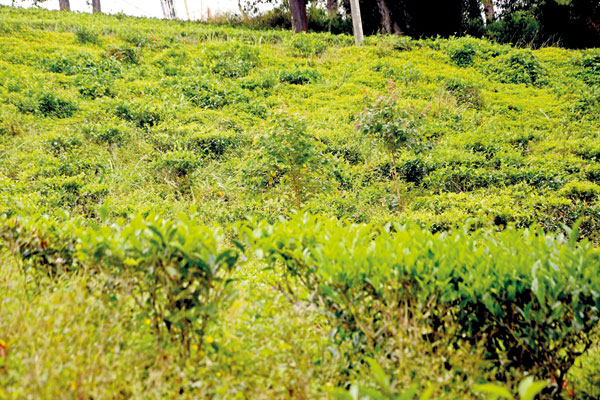News
Tea estate workers pick holes in unregulated ‘revenue sharing’ model
View(s):By Mimi Alphonsus
Sri Lanka’s plantation sector has many problems, but the revenue-sharing model is no magic cure, say workers on the Madulkele estate in the Kandy district.
The Revenue-Sharing Model (RSM) gives workers a part of the estate land on which they grow, pluck, and sell tea back to the company. It differs from the traditional daily wage model in that a worker is paid for the tea produced, not for the labour directly.
First introduced in 2008, the share of crop produced under the RSM now accounts for 25% of all crop produced at regional plantation companies (RPC), according to Roshan Rajadurai, spokesman for the Planters Association of Ceylon.
The association touts RSM as a productivity booster and the remedy to what would otherwise be a “slow and sure death of the plantation sector,” but not everyone is buying that story.


The picture postcard – perfect, pristine tea lines are not given under RSM but rather kept under direct company control. Instead, workers say they are granted less cultivable land with sparse, low-yielding tea bushes interspersed within thick forests.
In Madulkelle estate, RSM is practised alongside the traditional daily wage system with about half the estate land area tended by workers under RSM.
“Normally we work Monday through Thursday for Rs. 1,000 and then work on RSM lands Friday, Saturday, and Sunday. Sometimes we work on RSM on workday afternoons too,” said single mother, Ms Lakshmi, 53 [name changed].
RSM is supposed to provide flexible hours, but workers claim the management punishes those considered to be lagging by reallocating their land to others, effectively compelling seven-day workweeks and longer hours.
Mr. Sivakumar, another Madulkelle estate worker [name changed], claims that management even threatened to bring in outsiders to tend his land and deduct their wages from his pay. Madulkele estate management did not respond to an inquiry.
Workers say it is difficult to manage their plots to the company’s standard. The postcard-perfect, pristine tea lines are not given under RSM but rather kept under direct company control. Instead, workers are granted less cultivable land with sparse, low-yielding tea bushes interspersed within thick forests. Workers further allege favouritism wherein those chummy with management receive the most fruitful land.
“It’s difficult and dangerous to care for my tea bushes,” said Ms Selvi, 42, [name changed]. “It takes hours just to reach some of the bushes with snakes and wild animals encroaching into the area.” While previously, workers plucked tea in groups and looked out for each other, now they do so alone and say they bear the cost of workplace injuries themselves.
Workers claim management hasn’t replanted in over 100 years and is now passing responsibility for the wild, mismanaged areas on to the workers. Tea replanting is a costly affair, and plantations have replanted less than 1% each year rather than the recommended minimum of 2.5%, according to the think tank Advocata Institute.

Lakshmi's monthly income from RSM: a mere Rs. 8120 for which she spend more than Rs. 3000 on fertiliser, weedicide and farm hand
The Planters Association, however, believes workers are largely responsible for the decline of estates. “There is a huge shortage of workers because many people have left, so it doesn’t make sense to replant,” said Mr. Rajadurai. “Under the attendance [daily wage] system, people just clock in but don’t work half the time, leaving many bushes unplucked.”
According to Mr. Rajadurai, the RSM system has workers plucking more tea than ever, surpassing the minimums set by the old attendance model.
He argues that the system provides flexibility and the opportunity for higher pay.
“The rate per kilogram under RSM is about Rs. 60-Rs 80 depending on the estate, but the over-kilo rate [for every kg of tea plucked over the minimum under the daily wage system] is only Rs. 40,” said Mr. Rajadurai. “Some workers are making even Rs. 70,000-Rs 80,000 a month under RSM.”
Indeed, studies by both Advocata and the Institute for Social Development, an NGO based in Kandy, show an increase in wages thanks to RSM.
But for Ms. Lakshmi, the extra RSM income just isn’t worth it. She works three full days and some afternoons on her RSM plot and made only Rs. 8,120 this month selling 116 kilograms of tea leaves. To scrape together this meagre sum, she spent around Rs. 3,000 on fertiliser, weedicide, and on hiring extra hands to clear the forest. “The money does not justify the work and the input cost,” she says, “but I can’t stay away from RSM because more and more land is given to RSM and the estate gives us fewer and fewer days for daily wage work.”
Moreover, the revenue-sharing model seems to have missed the memo on sharing revenue. Workers are paid a ratio of the total revenue, so the price fluctuates with the market, but the ratio itself is solely decided by the company and remains a fraction of the final selling price of tea. A similar model of revenue sharing exists with tea smallholders who sell to factories at a 68:32 cultivator-to-factory ratio. According to the Tea Board, which determines the ratio for smallholders selling raw leaf to factories, they receive on average Rs 160-Rs 200 per kilogram of tea, more than double the amount that workers at Madulkelle get.
Unlike smallholders, RSM pricing has no government oversight, and workers have little power to negotiate as they have only one buyer—the company whose land they cultivate. [Calculating against tea auction prices, Madulkelle estate workers made at the very most 33% of the price of tea last year.]
Unions have criticised this power disparity, in particular claiming that the RSM model excludes the possibility of collective bargaining by establishing a direct management-employee relationship.
“There is no EPF/ETF for the work done on RSMs, nor is there any compensation even if the worker dies while plucking tea,” said a representative of the independent Ceylon Workers Red Flag Union. “Workers lose all of these labour protections, don’t have a say in determining prices, and we can’t get involved when some kind of injustice takes place.”
Companies, on the other hand, insist that unions oppose the model because it empowers workers and makes unions redundant.
Perhaps the strongest praise about the revenue-sharing model has been the dignity it grants to historically oppressed people. By managing their own plots, Mr. Rajadurai says, workers transform into “entrepreneurs’’.
But, for those dreaming of real land ownership, this comes nowhere close. “We aren’t allowed to plant a single banana tree, or put up a tiny shed to rest,” said Mr. Sivakumar. “The company can reclaim the land from us any time they want. We are more like coolies than employees.”
The best way to say that you found the home of your dreams is by finding it on Hitad.lk. We have listings for apartments for sale or rent in Sri Lanka, no matter what locale you're looking for! Whether you live in Colombo, Galle, Kandy, Matara, Jaffna and more - we've got them all!

